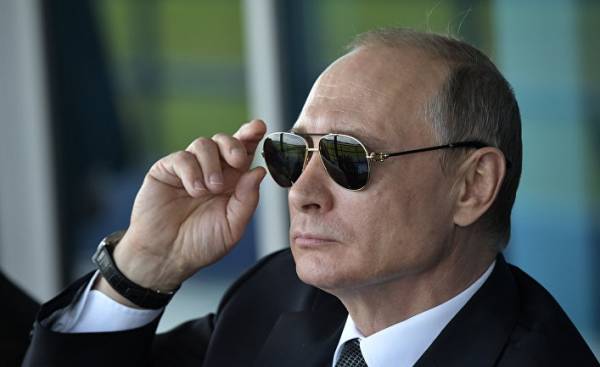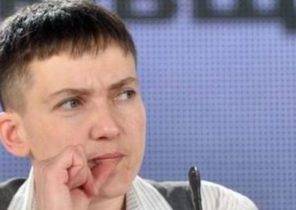
In the world only a few countries trust the President of Russia Vladimir Putin, considering that in international Affairs he behaves correctly. On average, only one in four respondents (26%) answered that he trusts the Russian leader. However, doubts about Putin’s foreign policy do not always coincide with the belief that Russia poses a threat to security. Among the residents of the 37 countries surveyed, on average only 31% of respondents said the power and influence of Russia a serious threat to the security of their States. It should be noted that exactly the same percentage of respondents (31%) named one of the most serious threats to national security China. Meanwhile, 35% of respondents believe that a serious threat to their national security, are the power and influence of America.
In General the image of Russia in the international arena is rather negative than positive. Worse best to include Russia in the US and Europe, whereas in Asia-Pacific region, the middle East, countries of sub-Saharan Africa and in Latin America is mixed. Only three countries out of those 37, where the study was conducted, the majority of respondents stated about their friendly attitude to Russia: it was Vietnam (83%), Greece (64%) and the Philippines (55%).
Many doubt that the Russian government remains committed to the principle of the protection of civil liberties. Overall, 30% of respondents agreed with the statement that Russia respects the rights of its citizens, 46% disagreed, and 17% could not answer this question. Most concerns regarding the protection of personal freedoms in Russia, the people living in the USA and Europe. The views of residents of the Asia-Pacific region, the Middle East and Latin America remains mixed, while most of the inhabitants of the countries of sub-Saharan Africa are convinced that the Russian government protects personal freedoms of its citizens.
These were the main conclusions of a new study of the analytical center Pew Research Center conducted in 37 countries with the participation of 40 951 respondents from 16 February to 8 may 2017.
The most rigid estimation to actions of Putin gave the Europeans: 78% of respondents in the European countries admitted that they do not trust the Russian leader. In the United States and Canada, too few people believe in the correctness of Putin’s actions in the international arena: of respondents voiced a negative attitude to the Russian leader, was three times more than those who treat it positively.
In several countries (Vietnam, Philippines, Tanzania, and Greece) half or more than half of respondents have a positive attitude to Putin’s actions in the international arena. In other countries, many respondents are unable to assess him or his actions: approximately one third or more of respondents in India, Indonesia, Ghana, Senegal, South Africa and Argentina, are unable to formulate their attitude to the Russian leader.
Although Putin and Russia received a fairly low rating in most countries, only a few perceive the power and influence of Russia as a serious threat to their national security. Almost all countries, except Poland and Jordan, believe that Russia is a less serious threat compared to the threats of Islamic state (a terrorist organization banned in Russia — approx. ed.) or climate change. The world average only 31% of respondents believe that Russia poses a serious threat to their national security. Meanwhile, 62% of respondents called it a serious threat of ISIS, 61% of climate change, 51% of the cyber attacks from other States, 51% — the state of the global economy. In fact, of the eight threats to the proposed respondents, Russia took the last place, dividing it with China (average 31%).
Overall, most respondents believe that the Russian government does not respect the personal freedoms of its citizens. Among the respondents from 37 countries, only 30% are confident that Russia adheres to the principle of democracy. For comparison, those who believe that France adheres to the principle of democracy, was 60%, USA — 54%, while China is only 25%.
Americans (80%) and Canadians (73%) believe that Putin’s government does not respect the personal freedoms of its citizens. In most European countries, the respondents answered in a similar way.
In the middle East and the Asia-Pacific region, the opinions of respondents in different countries were divided. The majority of respondents in Tunisia, Lebanon, Vietnam and the Philippines believe that Russia respects civil liberties, while the opinion of residents of other countries in these regions to this question were divided.
Skepticism about the actions of Putin in the international arena
There are few countries where respondents expressed the belief that in international politics, Putin is behaving correctly. Overall 60% of respondents said that they do not trust Putin and I doubt in the correctness of his actions in the international arena.
The least confidence in Putin has exhibited in Europe, where 78% of respondents expressed distrust to the Russian President. 89% of respondents in Poland, 88% in Spain, 87% in the Netherlands, 87% in Sweden and 80% in France do not trust Putin.
About half of respondents in Latin America also expressed doubts about Putin’s foreign policy. The same trends are typical for the Middle East, where the only exception was Tunisia’s opinions of the respondents were divided more evenly (32% trust, 39% do not trust the foreign policy of Russia).
The attitude to Putin remains mixed in Africa, where quite a large number of respondents are unable to answer the question about their attitude to the Russian President. In Tanzania only 51% of respondents expressed confidence in the correctness of Putin’s actions in the international arena.
Putin also trusted by 79% of the people of Vietnam, 54% Filipino and 50% of Greeks.
Despite the fact that the level of confidence in Putin’s foreign policy is generally low, in many countries, it enjoys more credibility than the US President Donald trump. For example, in Greece and Lebanon, Putin is way ahead of trump on the level of confidence in his foreign policy (in both countries, with a gap of 31 percentage point). The gap between them is very noticeable and Vietnam (21 percentage points). On the other hand, the level of confidence in the foreign policy of these leaders, Putin was much less than trump in Israel (28 percentage points), Nigeria and Poland (19 percentage points) and Kenya (18%).
Meanwhile, Americans cherish less confidence in Putin than Russians — to Trump: only 23% of Americans trust the actions of Putin on the world stage, while Trump is trusted by 53% of Russians. (The Pew center conducted a study in Russia in the same period of time that in 37 countries, however, the results of this study have not been included in this report.)
In some countries, when answering the question about trust to Putin important factor was the gender of the respondents. In 10 of 37 countries, men showed more confidence in Putin than women.
The attitude to Putin is also affected by political ideology. In 11 of the 21 countries where respondents were asked to answer the question of their ideological affiliation, those who put themselves on the right side of the political spectrum, demonstrated more confidence in Putin. This is what happened in Italy, where Putin’s actions are appreciated 39% of right and 24% left, and also in Greece (62% vs. 47%) and Australia (33% vs 19%).
In Venezuela, the trend was the opposite: there, the number of leftists who have demonstrated a favourable attitude to the actions of Putin in the international arena, were 28 percentage points more than supporters of right-wing views, report positively on the foreign policy of the Russian leader. The gap between the left and right of 11 percentage points is observed in Israel.
In the United States on the assessment of Putin’s actions is affected by party affiliation. Today, only 13% of Democrats trust Putin, while Republicans positively related to the actions of the Russian leader, 34%. In 2015 a similar gap between the parties was not: then the credibility of Putin’s actions showed 20% of Democrats and 17% Republicans.
Most countries do not consider Russia a serious threat
Compared with other global threats such as ISIS or climate change, the majority of respondents worldwide expressed only modest concern about the threat from Russia. Of the 37 countries surveyed, only Poland and Jordan has included Russia in the top three greatest threats to their national security.
In the US, 47% of respondents consider Russia a serious threat, but ISIS, cyberattacks and climate change cause Americans much more concerns. In Canada, only 30% of respondents believe the power and influence of Russia a serious threat, and there Russia occupies the bottom place in the list of the eight proposed threats.
With the exception of Poland, most Europeans demonstrated a noticeable, but not overwhelming concern with Russia’s actions. Less likely actions and influence of Russia concerned about the Greeks (24% of respondents described Russia as a serious threat) and Hungarians (28%).
In the middle East, only Turkey, the majority of respondents (54%) named Russia as a threat to their national security. In other countries of the region, these concerns are common to a lesser extent, and less about the threat of Russia concerned about the people of Israel (27%). As for the countries of sub-Saharan Africa and Latin America, only a third or less than one third of respondents there believe that Russia is a serious threat. The exception was Kenya, where his worries about the Russian threat expressed by 39% of respondents.
In some countries, the degree of concern of the Russian threat have varied depending on the level of education of respondents. For example, in the USA more educated people often talked about the fact that Russia is a serious threat than the less-educated (51% vs. 44%). The same difference associated with the level of education observed in the Philippines (better-educated people more often called Russia a threat than less educated respondents, and the gap between them amounted to 12 percentage points).
In the United States significant role in shaping the relations with Russia playing political views. 61% of Democrats believe that Russia is a serious threat to national security, whereas their opinion is shared by only 36% of Republicans.
In many countries, to include Russia unfriendly
In 19 of the 37 countries surveyed, the attitude to Russia remains more negative than positive. Overall, only 34% of respondents viewed Russia positively, while 40% treat it negatively. These figures indicate some increase of authority of Russia in the international arena: in 2015, Russia reacted negatively 51% of respondents.
The least friendly to Russia are in North America and Europe. 63% of Americans and 59% of Canadians hold a negative view of Russia. In Europe it includes 61% of respondents, and anti-Russian sentiments are particularly strong in the Netherlands (82%) and Sweden (78%).
In the middle East, the majority of respondents in Jordan (93%), Turkey (62%) and Israel (61%) have a negative attitude to Russia. Over the last decade the level of anti-Russian sentiment in Jordan has increased almost two times, and these changes began even before the Russian intervention in the Syrian conflict.
The views of the respondents were in Tunisia and Lebanon. In Lebanon, the attitude to Russia is largely influenced by religious affiliation: friendly attitude toward Russia 83% of Shias, 38% of Christians and only 21% are Sunni.
Opinion is divided in Latin America and the countries of sub-Saharan Africa, where many respondents are unable to answer the question about their attitude to Russia. If we talk about these two regions, the positive attitude to Russia is most common in Nigeria (45% friendly to Russia), Tanzania (45%) and Peru (41%), while a negative attitude is most common in South Africa (40% disapprove of Russia) and Brazil (36%).
In General, the most friendly to Russia are Vietnam, Greece and the Philippines: there are more than half of respondents have a positive attitude to Russia. In Greece the level of friendly relations with Russia remained almost unchanged since 2012, when the Pew center began to conduct such studies, and is currently at around 64%.
In the Philippines, and Vietnam towards Russia lately has improved. In Vietnam currently, 83% of respondents reported a positive attitude towards Russia is 8 percentage points more than in 2015. In the Philippines, where the President is now trying to establish relations with Russia on the background of deteriorating relations with the United States, respondents showed a more benevolent attitude to Russia (55%) than four years ago (35% in 2013).
The attitude of the Americans and Russians to each other became less hostile compared with the period of time when it deteriorated after the annexation of Crimea and the sanctions against Russia. Today, 41% of Russians have a positive attitude towards the USA, whereas in 2015, they were only 15%. American attitudes toward Russia has softened not so much: 2015 is only 22% of Americans treated Russia positively, whereas today they became 29%.
In the US, party membership began to have a significant impact on the attitude to Russia. In 2015 and Democrats (71% negative reviews), and Republicans (73%) had a negative attitude to Russia. Over the last two years the attitude of the Republicans towards Russia has become much more friendly, while the Democrats have not changed. Today 41% of Republicans and only 16% of Democrats friendly to Russia.
In many countries, older people are much less likely demonstrated a positive attitude towards Russia in comparison with young people: in any country the number of young people, a negative attitude to Russia has not exceeded the number of negative-minded representatives of the older generation. In 12 countries, respondents aged 50 and older is much worse attitude towards Russia, than respondents aged 18 to 29 years. The generation gap is especially noticeable in Japan and Brazil (both countries, the gap was 37 percentage points), Australia (24 percentage points) and South Korea (22 percentage points). In 11 other countries from 40 to 60% of the respondents aged 50 and older are unable to answer the question about his attitude to Russia.
Men are more likely to treat Russia positively than women. In seven countries the proportion of men responded favorably about Russia, 7-17 percentage points exceeded the proportion of women who hold the same opinion. The gender gap is particularly noticeable in France (he was 17 percentage points) and Germany (14 percentage points).
The relationship between educational level and attitude towards Russia is changing from region to region. In France, the USA and Sweden, people with low levels of education often belong to Russia positively. Meanwhile, in Tunisia and Turkey a positive attitude to Russia is typical rather for the better educated.
Many doubt that Russia protects personal freedoms of its citizens
Overall, only 30% of respondents who participated in the study believe that the Russian government protects personal freedoms of its citizens. 80% of Americans and 73% of Canadians believe that the Russian government does not respect the rights of its citizens. In Europe this opinion was shared by eight out of ten respondents in Sweden, the Netherlands, France, Poland and Germany. Most often, the question of the protection of human rights in Russia positively responded the Greeks (43%).
In Asia and the middle East opinions regarding the level of protection of personal freedoms in Russia were divided. The majority of respondents in Australia (75%), Japan (61%) and South Korea (56%) doubt that the Russian government protects the rights of its citizens, while the Vietnamese (85%) and Filipinos (59%) believe that the rights of Russian citizens are protected.
In the middle East Israel is the only country where the vast majority does not believe that the Putin government protects the rights of its citizens. Meanwhile, in Tunisia (80%) and Lebanon (70%) most respondents gave Russia a positive assessment on this issue.
In Africa South of the Sahara positive assessment of the degree of protection of the rights of citizens in Russia invariably outweigh the negative assessment, especially in Nigeria and Senegal, where 65% of respondents answered that, in their opinion, Putin’s government protects personal freedoms of its citizens.
In Latin America, respondents ‘ opinions were divided. In Venezuela and Mexico the gap between the percentage of respondents who believe that in Russia, the rights of citizens are protected, and those who don’t agree with that is 5-6 percentage points. In Argentina and Peru the proportion of respondents who do not believe that the Russian government respects the rights of its citizens, 11 percentage points higher than the share of those who believe the opposite. In Brazil, Chile and Colombia of respondents who believe that in Russia, citizens ‘ rights are not protected a little more.
In many countries, young people often expressed the confidence that Russia respects the personal freedoms of its citizens. No country in the proportion of older generation, who consider that in Russia the rights of citizens are protected, did not exceed the proportion of the younger generation who hold the same opinion. In Japan, South Korea, Germany, the Netherlands, Australia, Chile and Spain, the gap between the younger and older generation amounted to 14 percentage points.







